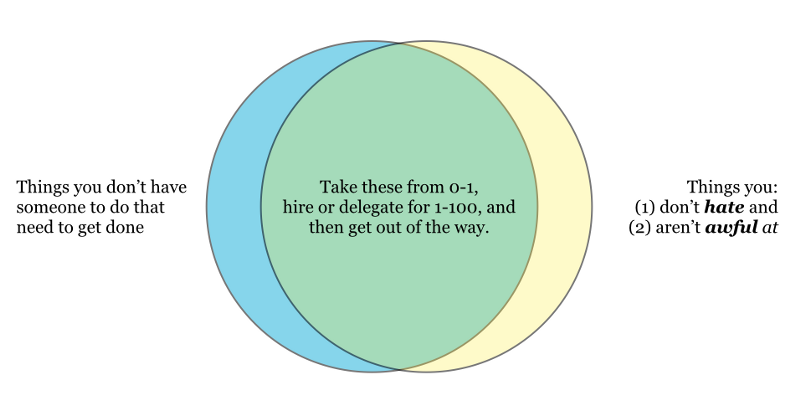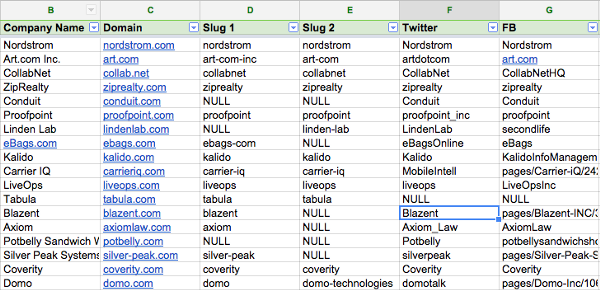What does an executive director (COO) do in a startup?
COO, Chief Operating Officer - Chief Operating Officer, analogue of the Executive Director in Russia
In this article, I will describe the ambiguity of the role of the executive director (ID) in a startup, and how I became one at Mattermark.
In general, titles should not be of great importance, but, unfortunately, everyone needs to assign a title. And me as well. Today, I - ID in Mattermark. The only agreement that can be reached by discussing the role of an ID in a company is that such an agreement is unattainable. Especially in startups. Its role varies from company to company, and some simply do not have such a role - not everyone is sure that startups generally need an ID.
')

On the left - tasks for which you do not have a special person.
In the middle - develop a system for their implementation, hire specialists or transfer them to another employee, and proceed to other tasks.
On the right - tasks that you do not hate and that you do not solve very badly.
I believe that the work of the ID that founded the company is to do important things for which individual specialists have not yet been hired, hire them or transfer responsibilities to someone instead of themselves, and go on. The founder ID must be one of those people who do well in dismissing themselves.
I haven't been an Eden all my life. Mattermark from a legal point of view is no worse than Referly, but, as Daniel put it, “Mattermark was not a strong point.” I did not participate in the basis of Referly. Daniel and Kevin hired me when I closed my startup, LaunchGram. I was one of the few workers at the time when Referly was not feeling very well, and in my job duties it was, in fact, “carry out the assignments for Daniel”.
I remember once, at dinner, Daniel told me that he and Kevin had decided to close Referly, and I was not sure that I would find a place in their next company. She said that she had no idea what they would do, but that they would be happy to join them and continue to carry out all kinds of tasks. I did, and it is not much different from what I do now.
When we started working on Mattermark, Daniel wrote and talked a lot with potential investors, I manually collected a cloud of data, and Kevin helped me transform my build process into a program. Our company consisted of a blogger, a dude who does unscaled things, and a programmer. When we were about to launch Mattermark, I had an epiphany. I asked Daniel and Kevin, “Am I the co-founder of this new thing? Because it seems to me that it is. " They assured me that this is true. As a result, Daniel became our CEO, Kevin - technical, and I didn’t need a more specific title than a co-founder.
We first collected the data manually. We had an advantage over others, that we were ready to do unscalable work to increase our value in the eyes of our customers.

Therefore, the first team we created was a team of analysts who filled a whole forest of spreadsheets with data from companies from venture capital firms. Initially I managed it, so at first we titled my post “Head of the Assembly and Data Processing”. When we built the processes to obtain certain reference data (we called them the “human algorithm”), we realized that I had created a ready-made team. It's time to hire a more qualified head of department.
In January 2014, we tried to go through the first round of investments, and learned that we need to prove that we can enter other segments of the user base. Our sales at that time were exclusively for clients coming to us on their own, and we received a lot of registrations from clients from non-venture companies - from bankers-investors and retail companies to realtors. I set out to increase profits and determine whether we are ready to start sales in new segments.
I coped well with the task, but did not want to make eight presentations a day. It was hard for me and for the company. Firing myself from sales, I fired one of the most productive sellers.
BTW: as an ID / founder, you often have to do what you don’t like. In the end, you will need to find someone who will do it for you - or you will simply burn at work.

At the beginning of work on the second mission, at the next meeting, one of our engineers asked: “Andy, I know that you work a lot, but what exactly do you do?”. We all laughed, and I explained what I was working on.
But I felt like an impostor because I was fulfilling my previous mission as an ordinary employee. But co-founders should be involved in managing teams and managing the business, shouldn’t they? It seemed to me that in order to be a leader, I needed to manage people. I asked myself what did I want to lead. I knew that the opportunity would come, and that while I was focusing on increasing the value of the company in the eyes of my clients, I was doing the right thing.
BTW: changing roles is a rather difficult task for the one who does it, but it also confuses the rest of the team. Make sure you bring your new responsibilities to everyone else.

My next mission is more difficult to define, since it included five submissions at once. This fall, we had to move to a new office, deal with hiring staff, launch customer support, build connections with clients, and turn our startup into a professionally managed company (lawyers, accountants, HR, and so on). At this time, my position could be entitled either “Vice-President for Equipment, Recruitment, Customer Support, Finance and HR”, or “Executive Director”. One of the investors suggested another option: "Vice-President for all garbage." So I chose "executive director".
In 2015, we hired an excellent customer relations manager, Manali Karmarkar. Now his team works like a well-oiled zipper. We have moved from centralized hiring with our own recruiters to a model that distributes this load among managers. In the end, we hired a vice president of finance, Emad Khan, who now deals with finance, HR and equipment.
Kate Rabua says: “You are fixing something all the time,” and this is actually the case. You also solve problems that you have not previously encountered. Problem solving in uncertain situations is the main skill of the ID.
In the future, my work will not change: I will have to find the most important tasks for which the company does not yet have specialists, hire them or transfer them to someone, and go on.
In this article, I will describe the ambiguity of the role of the executive director (ID) in a startup, and how I became one at Mattermark.
In general, titles should not be of great importance, but, unfortunately, everyone needs to assign a title. And me as well. Today, I - ID in Mattermark. The only agreement that can be reached by discussing the role of an ID in a company is that such an agreement is unattainable. Especially in startups. Its role varies from company to company, and some simply do not have such a role - not everyone is sure that startups generally need an ID.
')

On the left - tasks for which you do not have a special person.
In the middle - develop a system for their implementation, hire specialists or transfer them to another employee, and proceed to other tasks.
On the right - tasks that you do not hate and that you do not solve very badly.
I believe that the work of the ID that founded the company is to do important things for which individual specialists have not yet been hired, hire them or transfer responsibilities to someone instead of themselves, and go on. The founder ID must be one of those people who do well in dismissing themselves.
How did my role as an ED develop?
I haven't been an Eden all my life. Mattermark from a legal point of view is no worse than Referly, but, as Daniel put it, “Mattermark was not a strong point.” I did not participate in the basis of Referly. Daniel and Kevin hired me when I closed my startup, LaunchGram. I was one of the few workers at the time when Referly was not feeling very well, and in my job duties it was, in fact, “carry out the assignments for Daniel”.
I remember once, at dinner, Daniel told me that he and Kevin had decided to close Referly, and I was not sure that I would find a place in their next company. She said that she had no idea what they would do, but that they would be happy to join them and continue to carry out all kinds of tasks. I did, and it is not much different from what I do now.
When we started working on Mattermark, Daniel wrote and talked a lot with potential investors, I manually collected a cloud of data, and Kevin helped me transform my build process into a program. Our company consisted of a blogger, a dude who does unscaled things, and a programmer. When we were about to launch Mattermark, I had an epiphany. I asked Daniel and Kevin, “Am I the co-founder of this new thing? Because it seems to me that it is. " They assured me that this is true. As a result, Daniel became our CEO, Kevin - technical, and I didn’t need a more specific title than a co-founder.
Mission One: Run the data processing team
We first collected the data manually. We had an advantage over others, that we were ready to do unscalable work to increase our value in the eyes of our customers.

Therefore, the first team we created was a team of analysts who filled a whole forest of spreadsheets with data from companies from venture capital firms. Initially I managed it, so at first we titled my post “Head of the Assembly and Data Processing”. When we built the processes to obtain certain reference data (we called them the “human algorithm”), we realized that I had created a ready-made team. It's time to hire a more qualified head of department.
Mission Two: deal with sales
In January 2014, we tried to go through the first round of investments, and learned that we need to prove that we can enter other segments of the user base. Our sales at that time were exclusively for clients coming to us on their own, and we received a lot of registrations from clients from non-venture companies - from bankers-investors and retail companies to realtors. I set out to increase profits and determine whether we are ready to start sales in new segments.
I coped well with the task, but did not want to make eight presentations a day. It was hard for me and for the company. Firing myself from sales, I fired one of the most productive sellers.
BTW: as an ID / founder, you often have to do what you don’t like. In the end, you will need to find someone who will do it for you - or you will simply burn at work.

At the beginning of work on the second mission, at the next meeting, one of our engineers asked: “Andy, I know that you work a lot, but what exactly do you do?”. We all laughed, and I explained what I was working on.
But I felt like an impostor because I was fulfilling my previous mission as an ordinary employee. But co-founders should be involved in managing teams and managing the business, shouldn’t they? It seemed to me that in order to be a leader, I needed to manage people. I asked myself what did I want to lead. I knew that the opportunity would come, and that while I was focusing on increasing the value of the company in the eyes of my clients, I was doing the right thing.
BTW: changing roles is a rather difficult task for the one who does it, but it also confuses the rest of the team. Make sure you bring your new responsibilities to everyone else.
Mission Three: Become an Executive Director

My next mission is more difficult to define, since it included five submissions at once. This fall, we had to move to a new office, deal with hiring staff, launch customer support, build connections with clients, and turn our startup into a professionally managed company (lawyers, accountants, HR, and so on). At this time, my position could be entitled either “Vice-President for Equipment, Recruitment, Customer Support, Finance and HR”, or “Executive Director”. One of the investors suggested another option: "Vice-President for all garbage." So I chose "executive director".
Future
In 2015, we hired an excellent customer relations manager, Manali Karmarkar. Now his team works like a well-oiled zipper. We have moved from centralized hiring with our own recruiters to a model that distributes this load among managers. In the end, we hired a vice president of finance, Emad Khan, who now deals with finance, HR and equipment.
Kate Rabua says: “You are fixing something all the time,” and this is actually the case. You also solve problems that you have not previously encountered. Problem solving in uncertain situations is the main skill of the ID.
In the future, my work will not change: I will have to find the most important tasks for which the company does not yet have specialists, hire them or transfer them to someone, and go on.
Source: https://habr.com/ru/post/296366/
All Articles